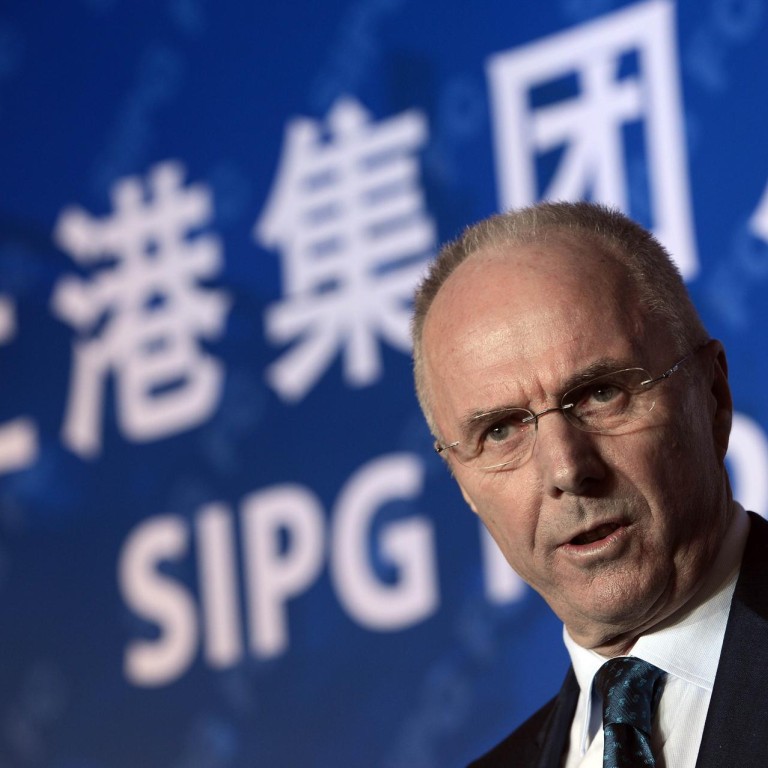
Shanghai soccer clubs splash the cash in battle for supremacy
City's teams bank on a fresh injection of money to buy some better on-field results
The battle for supremacy on the soccer pitch is escalating in Shanghai as two local clubs, both backed by powerful state-owned enterprises, splash out millions of dollars to sign big overseas coaches and high-calibre players to bolster their squads.
Top-flight outfits Shanghai Greenland Shenhua and Shanghai SIPG FC have earmarked at least 500 million yuan (HK$631 million) each to improve their competiveness in the Chinese Super League.
Talk of the free-spending teams' ambitions to earn a top-three league spot next season is just what thousands of local soccer fans wanted to hear after the lacklustre performances by the three main Shanghai-based squads in the last four years.
Shenhua, bought in January by the city's largest developer, Shanghai Greenland Group, from online tycoon Zhu Jun, is the best-loved of the three.
The municipal government directed Greenland to buy Shenhua when Zhu threatened to relocate the troubled club to the southwestern province of Yunnan .
But Shenhua finished ninth in the 16-team league, eclipsed by rivals in Guangzhou and Beijing.
The losses by Shenhua and the other local squads again left Shanghai officials red-faced as they desperately try to boost soccer in the city.
That's because there's more than hometown pride at stake. President Xi Jinping is a die-hard soccer fan and has repeatedly expressed his dream of creating a strong national squad to win international glory for China. Other cities appear to be doing their bit, particularly Guangzhou, whose Evergrande club won Asia's AFC Champions League last year.
Still, the Shanghai authorities are trying. Another government-orchestrated deal that saw Shanghai International Port Group take over Shanghai East Asia this week is believed to be part of the officials' efforts to salvage some pride on the pitch.
The team finished fifth in the national league this year and is bursting with young, promising players. The ownership switch came with a name change and now East Asia is flying the SIPG banner.
Sources close to the local government said top officials were convinced that massive spending on top-notch foreign coaches and imported players would help put SIPG on the fast track to a top-three league finish.
Those hopes were buoyed when SIPG beat out Guangzhou R&F to sign former England manager Sven-Goran Eriksson, by offering him a lavish annual pay and benefits package believed to be worth US$5 million after tax.
The SIPG offer was reportedly double the amount R&F planned to pay the Swede.
Eriksson led R&F to third spot this season, a result that means the team will represent China next year for the first time in the AFC competition.
Shenhua is also speeding up efforts to enlist quality players at home and abroad while scrambling to find a forward-thinking, Europe-based coach with the Midas touch.
The third Shanghai-based side, Shanghai Shenxin, is owned by businessman Xu Guoliang, who has no plans to join the spending frenzy.
That leaves Shanghai fans to dream of a renewed Shenhua-SIPG rivalry next season, with hopes of a repeat of the November 9, 2003 Shenhua-Shanghai International clash that turned out to be the game of the year across the country.
Shenhua, then owned by city government-held electronics manufacturer SVA and Shanghai Media and Entertainment Group, stunned International, which were sponsored by the nation's shipping juggernaut Cosco, in a 4-1 landslide before they clinched the title that year.
Both teams spent millions of yuan to sign top domestic players and competent imports as they vied for the local front-runner position.
But eight years later, Shenhua was stripped of the 2003 title when it was found to have paid referees to fix the match.
International's four key players - Shen Si, Qi Hong, Li Ming and Jiang Jin - also found themselves behind bars for terms ranging up to six years for taking bribes from Tianjin Teda to rig a game between the two sides in the final league round that year.
International's woeful 2-0 defeat to Tianjin cost the Shanghai team the championship.
A few years down the track and today's big spending by the two top Shanghai clubs could be just as damaging to the national league.
Super-rich owners splashing out to bankroll the transformation of local teams into national powerhouses could create an inflationary spiral that is damaging to the long-term growth of the sport.
What's worse, there can only be a kind of moral hazard in having state-owned businesses recklessly unleashing rivers of cash for record player transfer fees just for political gain.

